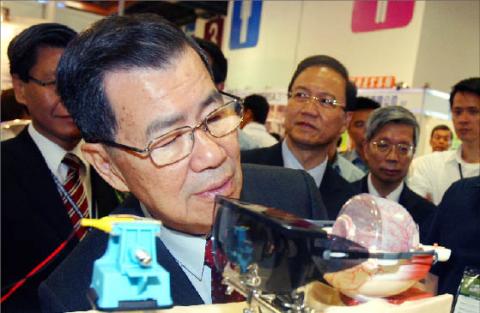The value of the biotech industry’s annual output may start accelerating from this year after the government approved plans to invest in the Taiwan Medtech Fund (TMF) last month and it plans to launch a promotion office for the industry’s incubation center in November, Vice President Vincent Siew (蕭萬長) said yesterday.
These efforts may help boost the output value of the biotech industry — one of the nation’s six key emerging industries — to NT$260 billion (US$9 billion) next year and up to more than NT$1 trillion in 10 years, according to data on the Cabinet’s Web site.
“The government-run ‘Taiwan Biotech Take-off Diamond Action Plan’ made a breakthrough this year, which may drive the industry toward a more systematic platform for developing related technologies,” Siew said at the opening of the four-day BioTaiwan event at Hall 1 of the Taipei World Trade Center.

Photo: CNA
Siew said one of the main developments of the plan — which was launched more than two years ago — would be the opening of a promotion office in November with a target to launch the biotech industry’s supra--incubator center.
“The office should create a platform for local biotech companies, offering them integrated services, including legal, marketing and intellectual property rights,” he said.
Besides, the industry might have more funding for research and development available in the near future, Siew said, as the government approved investment in the TMF — a fund aimed at supporting biotech companies — while also approving a National Development Fund investment.
This may further encourage other venture capitalists interested in the local biotech industry, he added.
A total of 485 companies — including larger and listed biotech firms — occupy 950 booths at this year’s BioTaiwan event, the -highest number in history, the Taiwan Bio Industry Organization said yesterday.
The organization said the technology of artificial electronic retinal chips would be the main theme of this year’s event, developed by a research team led by former National Chiao Tung University president Peter Wu (吳重雨).
The latest breakthrough is a combined effort of biotechnology, medical science, electrical engineering and optical engineering, the organization said.
A preliminary study showed successful electroretinography signals were produced after the retinal chips were implanted in animals, indicating that the method is workable and might become an alternative approach to dealing with vision loss in the future, it added.

Nvidia Corp chief executive officer Jensen Huang (黃仁勳) on Monday introduced the company’s latest supercomputer platform, featuring six new chips made by Taiwan Semiconductor Manufacturing Co (TSMC, 台積電), saying that it is now “in full production.” “If Vera Rubin is going to be in time for this year, it must be in production by now, and so, today I can tell you that Vera Rubin is in full production,” Huang said during his keynote speech at CES in Las Vegas. The rollout of six concurrent chips for Vera Rubin — the company’s next-generation artificial intelligence (AI) computing platform — marks a strategic

REVENUE PERFORMANCE: Cloud and network products, and electronic components saw strong increases, while smart consumer electronics and computing products fell Hon Hai Precision Industry Co (鴻海精密) yesterday posted 26.51 percent quarterly growth in revenue for last quarter to NT$2.6 trillion (US$82.44 billion), the strongest on record for the period and above expectations, but the company forecast a slight revenue dip this quarter due to seasonal factors. On an annual basis, revenue last quarter grew 22.07 percent, the company said. Analysts on average estimated about NT$2.4 trillion increase. Hon Hai, which assembles servers for Nvidia Corp and iPhones for Apple Inc, is expanding its capacity in the US, adding artificial intelligence (AI) server production in Wisconsin and Texas, where it operates established campuses. This

US President Donald Trump on Friday blocked US photonics firm HieFo Corp’s US$3 million acquisition of assets in New Jersey-based aerospace and defense specialist Emcore Corp, citing national security and China-related concerns. In an order released by the White House, Trump said HieFo was “controlled by a citizen of the People’s Republic of China” and that its 2024 acquisition of Emcore’s businesses led the US president to believe that it might “take action that threatens to impair the national security of the United States.” The order did not name the person or detail Trump’s concerns. “The Transaction is hereby prohibited,”

Garment maker Makalot Industrial Co (聚陽) yesterday reported lower-than-expected fourth-quarter revenue of NT$7.93 billion (US$251.44 million), down 9.48 percent from NT$8.76 billion a year earlier. On a quarterly basis, revenue fell 10.83 percent from NT$8.89 billion, company data showed. The figure was also lower than market expectations of NT$8.05 billion, according to data compiled by Yuanta Securities Investment and Consulting Co (元大投顧), which had projected NT$8.22 billion. Makalot’s revenue this quarter would likely increase by a mid-teens percentage as the industry is entering its high season, Yuanta said. Overall, Makalot’s revenue last year totaled NT$34.43 billion, down 3.08 percent from its record NT$35.52